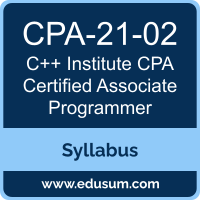 Use this quick start guide to collect all the information about C++ Institute CPA Certified Associate Programmer (CPA-21-02) Certification exam. This study guide provides a list of objectives and resources that will help you prepare for items on the CPA-21-02 CPA - C++ Certified Associate Programmer exam. The Sample Questions will help you identify the type and difficulty level of the questions and the Practice Exams will make you familiar with the format and environment of an exam. You should refer this guide carefully before attempting your actual C++ Institute CPA - C++ certification exam.
Use this quick start guide to collect all the information about C++ Institute CPA Certified Associate Programmer (CPA-21-02) Certification exam. This study guide provides a list of objectives and resources that will help you prepare for items on the CPA-21-02 CPA - C++ Certified Associate Programmer exam. The Sample Questions will help you identify the type and difficulty level of the questions and the Practice Exams will make you familiar with the format and environment of an exam. You should refer this guide carefully before attempting your actual C++ Institute CPA - C++ certification exam.
The C++ Institute CPA Certified Associate Programmer certification is mainly targeted to those candidates who want to build their career in C++ programming domain. The CPA - C++ Certified Associate Programmer exam verifies that the candidate possesses the fundamental knowledge and proven skills in the area of C++ Institute CPA - C++.
C++ Institute CPA Certified Associate Programmer Exam Summary:
| Exam Name | CPA - C++ Certified Associate Programmer |
| Exam Code | CPA-21-02 |
| Exam Price | $295 (USD) |
| Duration | 65 mins |
| Number of Questions | 40 |
| Passing Score | 70% |
| Books / Training |
C++ Essentials 2 – Cisco Networking Academy (Go to Cisco NetAcad) C++ Essentials 2 (Intermediate) – OpenEDG Learning Platform (Go to OpenEDG Edube) |
| Schedule Exam | Pearson VUE |
| Sample Questions | C++ Institute CPA Certified Associate Programmer Sample Questions |
| Practice Exam | C++ Institute CPA-21-02 Certification Practice Exam |
C++ Institute CPA-21-02 Exam Syllabus Topics:
| Topic | Details | Weights |
|---|---|---|
| Types & Operators |
- Apply unary, binary, and ternary operators; understand precedence and associativity. - Use arithmetic, relational, logical, bitwise, assignment, increment/decrement, and short-circuit operators. - Apply the ternary conditional operator (?:). - Recognize predefined standard types, data ranges, and internal representations. - Use literals in various forms (decimal, octal, hexadecimal, binary, floating-point, char, bool). - Work with std::string objects, escape sequences, and string operations (e.g., compare, size, substr, insert). - Declare and manipulate aggregates (vectors, arrays, structures, unions, enums). - Understand type conversion rules, type casting, promotion, and the sizeof operator. - Apply declaration modifiers (signed, unsigned, static, const). Scope & Keywords: operators, precedence rules, data types, literals, sizeof, std::string methods (compare, substr, insert), arrays, vectors, aggregates, enums, type casting, declaration modifiers. |
24.5% |
| Control & Exceptions |
- Use conditional statements (if, else), loops (while, do, for), and control flow keywords (break, continue, goto). - Apply multiple-selection constructs (switch, case, default). - Understand the use of the return statement to exit functions. - Understand exception handling mechanisms (try, catch, throw, catch-all). - Recognize exception hierarchies and use the throw() specifier in function declarations. Scope & Keywords: if, switch, loops, break, continue, goto, return, try, catch, throw, exception classes, exception specifiers. |
18% |
| Functions & Preprocessor Directives |
- Define, declare, and invoke functions with correct syntax. - Use typed and void functions with appropriate return statements. - Overload functions and assign default parameter values. - Pass arguments by value, reference, and pointer. - Implement recursion. - Apply conventions for main() function declarations. - Use preprocessor directives for conditional compilation (#if, #endif, #else, #ifdef). - Define parameterized and non-parameterized macros and understand macro expansion. Scope & Keywords: function declarations, overloading, default parameters, argument passing, recursion, main(), #include, #define, #if, macro expansion. |
17.5% |
| Pointers |
- Declare and initialize pointers to variables, objects, functions, and aggregates. - Dereference pointers and use the address-of operator (&). - Perform pointer arithmetic and comparisons. - Manage dynamic memory with new, delete, delete[], and avoid memory leaks. Scope & Keywords: pointer declaration, dereferencing, nullptr, pointer arithmetic, dynamic memory allocation, new, delete, memory leaks. |
11% |
| Classes & Namespaces |
- Understand OOP principles: inheritance, encapsulation, polymorphism, abstraction. - Define classes, apply access specifiers, and use class components with the :: operator and this pointer. - Declare and invoke constructors and destructors, including default, copy, and explicit constructors. - Overload class member functions and operators. - Implement inheritance (single, multiple), manage visibility, and understand access levels. - Work with class type compatibility, casting between types, and use static_cast, dynamic_cast. - Override methods, use virtual and polymorphic functions, and apply const in objects and members. - Use friend classes and functions. - Define and use namespaces, including anonymous and named namespaces, aliases, and the scope resolution operator (::). Scope & Keywords: OOP concepts, class declaration, constructors, destructors, operator overloading, inheritance, casting, virtual methods, const members, friend, namespaces, scope resolution. |
29% |
To ensure success in C++ Institute CPA - C++ certification exam, we recommend authorized training course, practice test and hands-on experience to prepare for CPA - C++ Certified Associate Programmer (CPA-21-02) exam.
